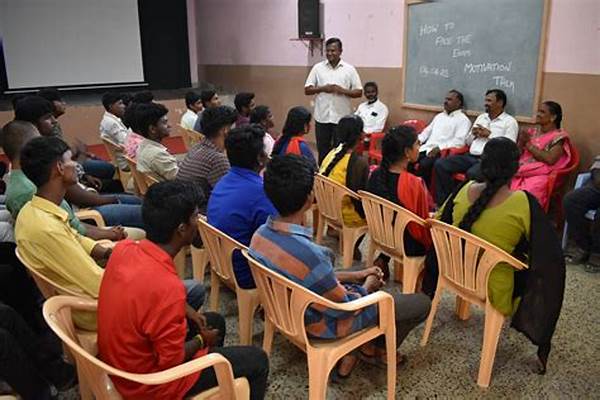In today’s rapidly changing world, preserving cultural heritage is more important than ever. Educational programs for community heritage awareness play a crucial role in ensuring that the rich tapestry of our collective past is not forgotten. By participating in these programs, individuals gain a deeper understanding and appreciation of the traditions, stories, and values that have shaped their communities. Let’s explore how these initiatives can transform communities and empower individuals to become stewards of their own heritage.
Read Now : Traditional Techniques Meet Modern Design
Importance of Educational Programs for Community Heritage Awareness
Participating in educational programs for community heritage awareness is essential in bridging the gap between the past and the present. These programs enable individuals, especially the younger generation, to connect with their roots and understand the significance of their heritage. They serve as a beacon of knowledge, bringing together diverse groups to learn about and celebrate their shared history. By fostering a sense of belonging and pride, educational programs encourage individuals to actively participate in preserving their cultural legacy. Moreover, they help dismantle stereotypes and misconceptions about different cultures, promoting a more inclusive and harmonious society. Investing time in such initiatives not only enriches personal understanding but also strengthens the community’s social fabric.
Benefits of Educational Programs for Community Heritage Awareness
1. Cultural Preservation: Educational programs for community heritage awareness ensure that traditional practices and knowledge are passed down through generations, preserving cultural identity.
2. Social Cohesion: These programs foster a sense of unity and belonging among community members by highlighting shared history and values.
3. Increased Awareness: Participants of educational programs gain insights into their cultural heritage, enabling them to appreciate and celebrate diversity.
4. Empowerment: By engaging with their history, individuals feel empowered to contribute actively to their community’s cultural narrative.
5. Generational Bridges: These programs create opportunities for intergenerational dialogue, allowing older and younger generations to connect and learn from one another.
Implementation Strategies for Educational Programs
To create impactful educational programs for community heritage awareness, careful planning and community engagement are key. Firstly, it is crucial to involve local historians, elders, and cultural practitioners to ensure the authenticity and accuracy of the content. This collaborative approach helps in designing programs that resonate with the community’s needs and interests. Additionally, utilizing interactive methods, such as workshops, storytelling sessions, and immersive experiences, can make learning more engaging and accessible. By integrating technology and social media, programs can reach a wider audience, inviting participation from individuals unable to attend in person. Ultimately, these strategies can cultivate a dynamic learning environment and inspire a collective commitment to heritage conservation.
Read Now : Emerging Trends In Renewable Materials
Overcoming Challenges in Promoting Heritage Awareness
Despite the undeniable benefits of educational programs for community heritage awareness, several challenges may hinder their effectiveness. One of the main obstacles is securing adequate funding and resources to sustain these initiatives. To address this, communities can explore partnerships with local businesses, non-profit organizations, and government agencies. Another challenge is ensuring inclusivity and representation; therefore, programs must be designed to cater to diverse cultural backgrounds and experiences. Additionally, combating apathy and lack of interest, especially among younger generations, requires innovative outreach and communication strategies. By proactively addressing these challenges, communities can ensure that these vital programs continue to thrive and make a positive impact.
The Role of Technology in Enhancing Heritage Education
In today’s digital age, technology can significantly enhance educational programs for community heritage awareness. Platforms like virtual reality and augmented reality can offer immersive experiences that transport individuals into historical settings, making history come alive. Online resources, such as databases and digital archives, provide easy access to a wealth of information and artifacts. Moreover, social media can serve as a powerful tool for engaging a broader audience and sharing community stories and achievements. By integrating technology, heritage education can become more appealing and accessible, encouraging greater participation and interest.
Building Sustainable Heritage Awareness Programs
Creating sustainable educational programs for community heritage awareness requires a long-term vision and commitment. It is essential to develop a strategic plan that outlines goals, objectives, and evaluation criteria. Regular assessments and feedback from participants can help refine and improve program content and delivery. Additionally, mentoring and training local champions who can take ownership of the initiatives ensures continuity and sustainability. Celebrating successes and milestones publicly can also boost morale and encourage ongoing participation. By fostering a collaborative and adaptive approach, communities can build lasting programs that continue to educate and inspire future generations.
Conclusion
In conclusion, educational programs for community heritage awareness are vital tools for preserving and celebrating cultural heritage. They provide individuals with the knowledge and skills needed to understand and appreciate their roots, fostering a sense of pride and belonging. Through innovative strategies, overcoming challenges, and leveraging technology, these programs can achieve significant and sustainable impacts. By investing in heritage education, communities not only preserve their past but also empower their present and future generations to be active and informed custodians of their rich cultural legacy.





